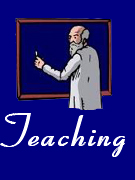





Syllabus for Math 461
Fall Semester 2006
Textbook: Elementary Topology, by Michael Gemignani. We will cover most of Chapters 2-4 and 7-9 of the book.
Prerequisites: MTH 320 or MTH 428H. Recommended: MTH 310.
Grading Scheme
| Component | Date | Worth |
|---|---|---|
| Homework | Wednesdays | 30% |
| Midterm Exam | October 13 | 25% |
| Presentation | Various | 15% |
| Final Exam | December 12 | 30% |
Policy on missed work. The only valid reasons for missing an exam are: (1) illness, or (2) a conflicting University activity that cannot be rescheduled. Claims involving such contingencies must be supported by verifiable documentation signed by: (1) your physician in case of illness, or (2) your faculty supervisor in case of a non-rescheduleable University activity. Each case will be handled on an individual basis.
No late homework will be accepted. However, I will drop your lowest homework score.
Homework Policy
- You should try to do all of the problems on your own before getting together with others. It does not benefit you (on exams and in the real world when you need to use math) to simply get solutions from your classmates! In fact, there is research suggesting that group work is much more productive when everyone has thought about the problems before getting together.
- Everyone must turn in their own solutions. In other words, you should write up your final solutions in the privacy of your own room (or your own library, cafe, bar, roof, etc.).
Here are a few guidelines for how to write up the proofs:
- Write up the problems in order,
using only one side of the page and leaving lots
of space for me to write comments. Please staple your
sheets together.
- Begin each problem with a statement of that problem.
- Proofs should be written in complete sentences, with appropriate
use made of mathematical notation (your textbook will serve as
a guide to how to do this). Proofread what you've done to be
sure that it's complete and makes sense. Remember that proof-writing
is above all an act of communication, and that the ultimage goal is
clarity.
- If you leave a small gap in a proof that you're not able
to fill in, note this down. I'll try to indicate how to fill
it in my comments.
- Start early! This way, if you are stuck, you can still discuss the problem with other students or with me.
Presentations
We will start scheduling student presentations in late October or early November. You should definitely discuss the topic with me before presenting it. I would also be more than happy to suggest topics for presentations.
Academic Integrity
Students are reminded that the University's policy concerning academic integrity is covered in the Spartan Life booklet, General Student Regulations. According to the handbook, "no student shall claim or submit the work of another as one's own".
Important Dates
| 9/1/06 | Open add period by computer enrollment ends. |
| 9/21/06 | Last day to drop with no record of course on transcript; end of tuition refund period. |
| 10/17/06 | Last day to drop a course or withdraw from all courses with no grade reported. |
dfuter at math msu edu Last modified: Wed Aug 23 14:31:53 PDT 2006